
The national operation to tackle knife crime – known as Operation Sceptre – has seized thousands of knives, police chiefs have said.
The operation, which was undertaken by all 43 forces in England and Wales as well as the British Transport Police, also saw 1,947 arrests, with 831 related to knife crime offences.
A number of different tactics were used to remove knives from the streets, including honesty bins, knife arches and weapon sweeps.
Officers seized 1,074 knives while 8,401 were surrendered or seized during sweeps. This is an increase of 14% since the last Operation Sceptre in 2021, according to figures from the National Police Chiefs’ Council (NPCC).

Deputy Assistant Commissioner Graham McNulty, the NPCC’s lead for knife crime, told the PA news agency that the increase is down to police using intelligence to target habitual knife carriers.
He believes awareness campaigns have led more members of the public to tip the police off about weapons.
As a result, last year, while so-called knife-enabled crime went down, the number of people charged with knife possession went up, he said.
The police also worked with the Prison Service to sweep cells, with 131 inmates searched in 100 cells across eight jails. They seized 29 weapons during the cell searches, including razor blades fixed to toothbrushes and other handles.
This was the second year that the Prison Service has been involved in the crackdown, and there are hopes to expand the operation further next year.

Other weapons seized by police over the week included swords, hunting knives and machetes.
Mr McNulty said bigger blades such as machetes and hunting knives are being used more often in the most serious attacks.
He told PA: “In relation to homicide and serious stabbings… we are seeing larger blades, we are seeing machetes more, we are seeing combat knives, rambo knives, those sorts of knives, particularly among those forces that have gang issues.
“We are seeing in the most serious stab injuries more use of larger, bigger knives, which obviously cause horrific injuries to individuals.”
Under the Offensive Weapons Act, that came into force last year, possession of these kinds of knives is illegal, whether in a public or private place.
Young people must understand that carrying a knife is never the answer, nor does it offer the protection they think it does. It only puts them at greater risk
There was also an education and youth engagement element to the week, with 966 local events held and 1,917 schools visited.
Mr McNulty said the operation saw a “real crackdown” on knife crime.
“Operation Sceptre saw a real crackdown on the serious violence associated with knife crime and has delivered some outstanding results,” he said.
“Op Sceptre highlights the continuing commitment of the police working with the public in preventing young people carrying knives and this latest Sceptre week saw our engagement with schools and communities increase to higher levels than ever before.
“Young people must understand that carrying a knife is never the answer, nor does it offer the protection they think it does. It only puts them at greater risk.”
Crime, Policing and Probation Minister Kit Malthouse said there is “nothing more terrifying” for a parent than the thought of the child not making it home.
“We have to work day and night to keep our kids safe,” he said.
“Operations like this are helping us make our streets safer each day.”
Chief Inspector Rob Ranstead, who led the operation for the Metropolitan Police, said making London safer is his force’s priority.
“Our mission is to bear down on violence and make communities safer across London – it’s our priority,” he said.
“Operation Sceptre is an intensification of the work we already do every single day and officers will not stop doing everything they can to target those carrying weapons on our streets.”







